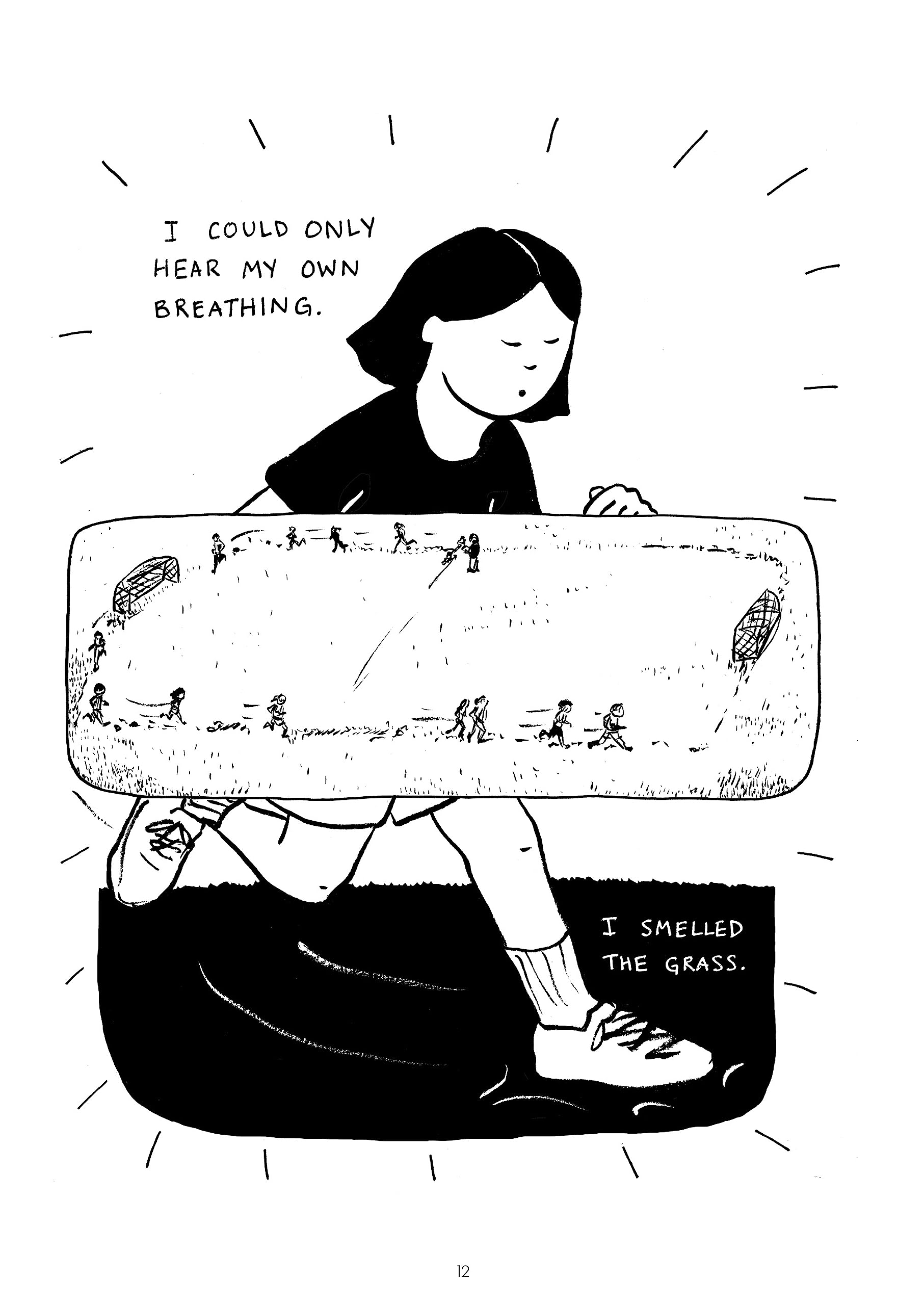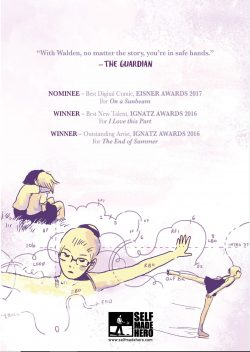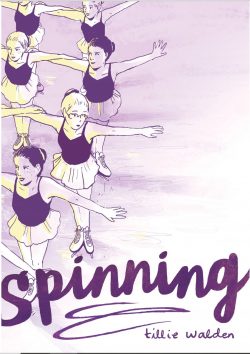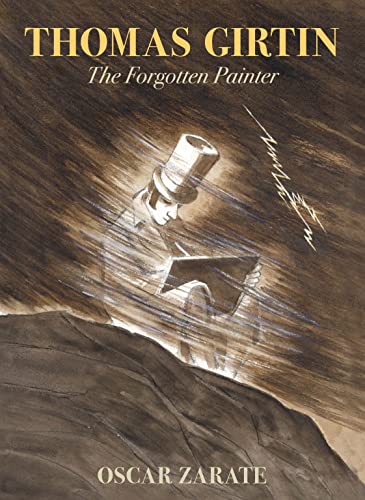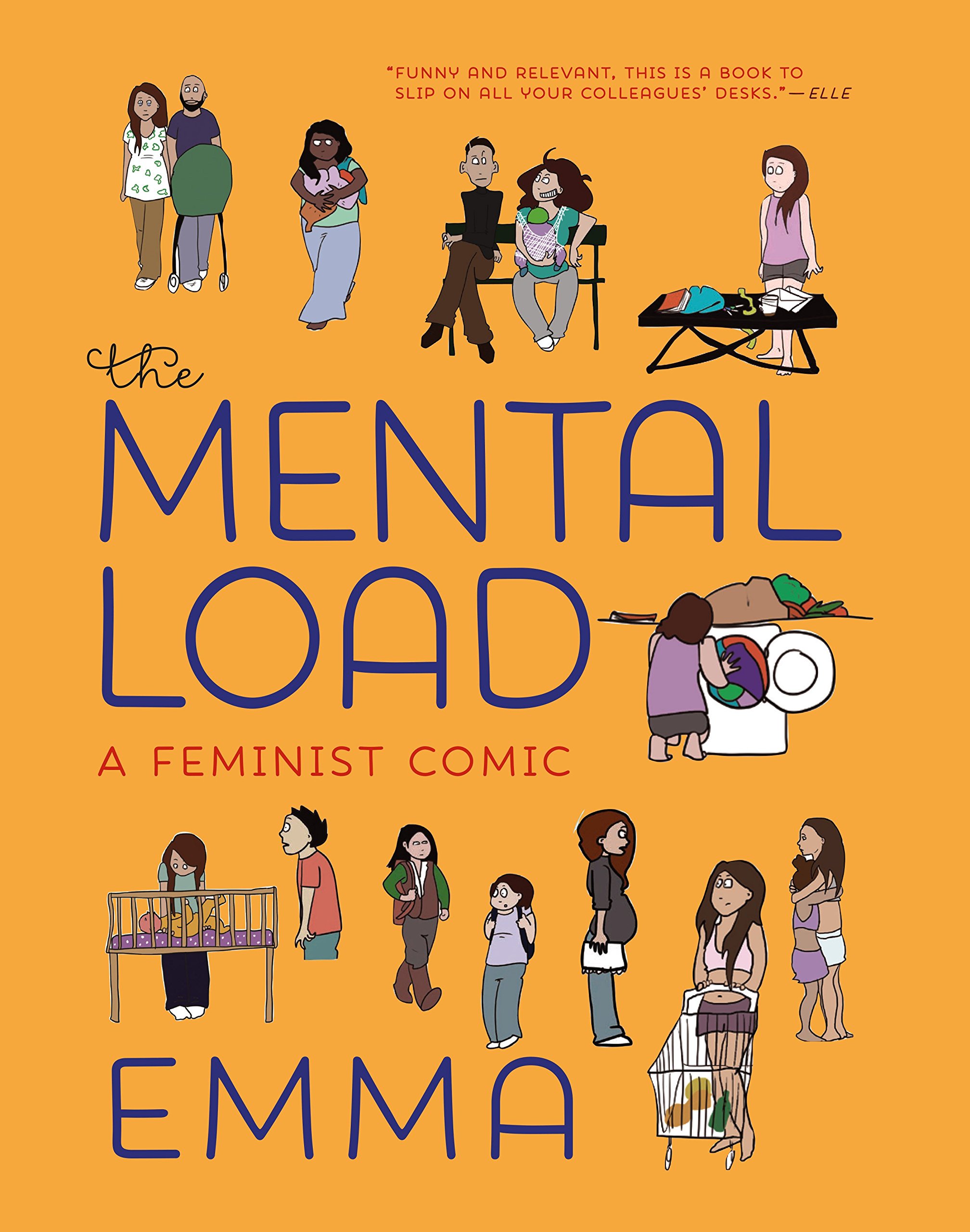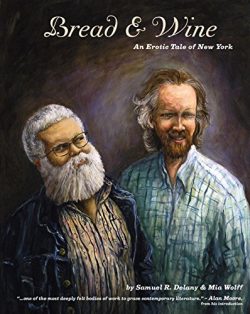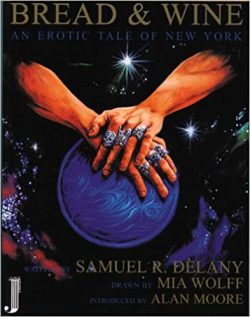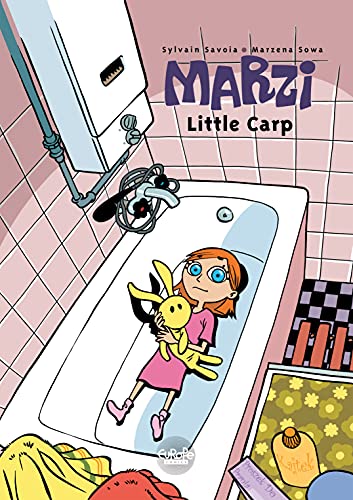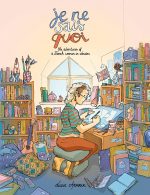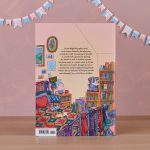
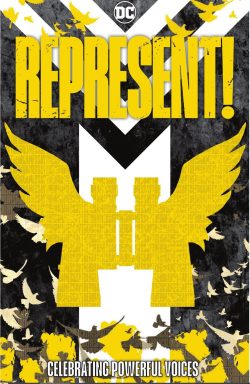
By Christian Cooper, Jesse J. Holland, Regine Sawyer, Nadira Jamerson, Tara Roberts, Dominike “Domo” Stanton, Onyekachi Akalonu, N. Steven Harris, Justin Ellis, Frederick Joseph, Gabe Eltaeb, Dan Liburd, Keah Brown, Camrus Johnson, Alitha E. Martinez, Mark Morales, Doug Braithwaite, Eric Battle, Brittney Williams, Yancey Labat, Valentine De Landro, Travel Foreman, Keron Grant, Koi Turnbull, Don Hudson, Tony Akins, Moritat & various (DC Comics)
ISBN: 978-1-77951-419-6 (HB/Digital)
Originally published digitally in 14 chapters from September 2020 to June 2021, Represent! was – in the words of Executive Editor Marie Javins – “designed to showcase and introduce creators traditionally underrepresented in the mainstream comics book medium.” As such it was part of a greater effort by that mainstream – which contemporaneously sparked a similar project from the House of Ideas that became a string of one-shot anthologies known as Marvel Voices…
Operating in conjunction with writers, artists and other creatives of colour (both In- and especially Out-Industry) allowed greater leeway and by displaying editorial willingness to address issues, themes and opinions – and even formerly entirely-ignored and marginalised sectors of society – the series was not dictated to by commercial economics and a militant fanbase addicted to continuity.
The results were admittedly mixed, but generally the freedom elevated the material to the levels of the best of adult European comics…
Here, the result is an engaging trek through history, studied observation, personal anecdote and even fantasy, with perspectives seldom – if ever – seen in your everyday funnybook. It could not possibly all be to everyone’s taste, but this weary, aged, comfortably privileged-yet broken English white boy found plenty to enjoy and much to ponder…
Exploring all aspects of the non-white American experience, from inner-imaginative landscapes and escapes to personal ideologies, each literary-leaning comics tales comes with a brief bio of the writer (sometimes that’s also the illustrator) and unless stated otherwise is lettered by the tireless Deron Bennett.
Not so Chapter 1:‘It’s a Bird’, which sees Robert Clark put words to a heartwarming tale of family and generational birdwatching written by 1990s comics creator Christian Cooper (Star Trek, The Darkhold, Excalibur and Marvel’s first openly gay writer/editor). The modern day rights activist is here supported by illustrated by Alitha E. Martinez (Heroes, World of Wakanda, Iron Man, Mighty Crusaders, Batgirl) & Emilo Lopez.
Editor, Educator, broadcaster, historian and author Jesse J. Holland (Black Panther: Who is the Black Panther?, Star Wars: The Force Awakens – Finn’s Story, The Invisibles: The Untold Story of African American Slaves in the White House) unites with British born Doug Braithwaite (Hulk, Captain America, Justice, Judge Dredd, The Punisher) & colourist Trish Mulvihill to relate a true tale. In disjointed yet carefully tailored flashbacks, a saga of endurance on a farm in rural Mississippi from 1980 to now unfolds: tracing the lives of the Hollands – a family still working land secured by ancestor and freed slave Conklin Holland in 1899…
‘Food for Thought’ comes courtesy of award-winning writer, small press publisher, essayist and journalist Regine Sawyer, with Eric Battle (Kobalt, Hardware, Batman, Wonder Woman, Spider-Man, Green Arrow, Green Lantern, Flash, Walking Dead) & Bryan Valenza rendering joyous reminiscences of a daughter shopping, cooking, talking and learning with her father in Queens, NYC, after which journalist Nadira Jamerson joins Brittney Williams (Goldie Vance, Betty & Veronica, Rugrats, Shade the Changing Girl, Lois Lane and the Friendship Challenge, Patsy Walker, A.K.A. Hellcat) & Andrew Dalhouse on the harrowing, but ultimately triumphant, journey of a black mother fighting a hostile medical system to secure an accurate diagnosis of a mystery ailment. Sometimes, all that’s necessary is to find someone to ‘Believe You’…
Chapter 5 declares ‘My Granny Was a Hero’ as Tara Roberts – educator, writer, editor and fellow of both MIT’s Open Documentary Lab and the National Geographic Storytelling project – unites with Yancey Labat (DC Superhero Girls, Legion of Super-Heroes) & colourist Monica Kubina as a little girl in 1983 changes her idol from Wonder Woman to someone far closer to home after learning how her own family unwillingly “came to America” from Cameroon in 1860…
Coloured by Emilio Lopez, ‘The Lesson’ is otherwise an all-Dominike “Domo” Stanton (Moon Girl & Devil Dinosaur, Starbrand & Nightmask, Nubia & the Amazons) affair about violent high school days and one crucial path to escape, before writer/journalist Onyekachi Akalonu connects with Valentine De Landro (Bitch Planet, Marvel Knights: 4, X-Factor, Silver Surfer: Ghost Light, Black Manta) & Marissa Louise to offer social context on repressed young black lives by advocating ‘Fight Fires with Spray Cans’…
Coloured by Walt Barna, Chapter 8 stands ‘In Defense of Free Speech’ as 20-year comics veteran N. Steven Harris (Aztek: The Ultimate Man, Batman: Officer Down, Deadpool, X-Force, Generation X, The Wild storm: Michael Cray, Indigo Clan) recalls a time when college lectures on black culture and experience required volunteer security teams to be heard at all…
‘Weight of the World’ – by writer/editor/media producer Justin Ellis (Problem Areas, How to Fix a Drug Scandal, The Cruelty of Nice Folks), Travel Foreman (Cla$$war, Doctor Spectrum, Immortal Iron Fist, Star Wars, Black Cat) & Rex Lokus – explores the pressures family can innocently inflict on a black kid graduating high school… and how the right librarian at the right moment can turn the page on the future…
For ‘The Flightless Bird’, prominent activist, philanthropist and bestselling author Frederick Joseph collaborates with Keron Grant (Fantastic Four, Kaboom, Son of Vulcan, Spider-Man/Doctor Octopus, New Mutants) on a tale of introspection and hope when a young man is diagnosed with a killer disease.
Gabe Eltaeb (Aquaman, Batman, Star Wars) then exposes an ‘American Mongrel’ with middle school kid Abdul learning some painful truths in 1991 as his mixed Hispanic/Iraqi heritage make him an instant and easy target during the first Iraq war. Thankfully, his grampa has seen all this before…
Celebrated sports science specialist Dan Liburd asks Koi Turnbull (Fathom, Wolverine: Dangerous Games, Superman Confidential) & Tony A?ina to join him at ‘The Water’s Edge Within Reach’; exploring the assumed limits of human aspiration and physical achievement via a career in “ironman” eventing, before journalist, actor, screenwriter and author Keah Brown (The Pretty One, Sam’s Super Seats) luxuriates in superhero excess with Don Hudson (Nick Fury/SHIELD, Forever Amber, Scalped, Curse of Brimstone) & Nick Filardi. They enquire ‘Who Hired the Kid?’: debuting a sheer escapist delight in time-travelling, monster-fighting schoolgirl adventurer “The Vet”…
The wonderment concludes by going out big with actor, director, animator and comics writer Camrus Johnson joining Tony Akins (Terminator, Star Wars, Hellblazer: Papa Midnight, Fables, Jack of Fables, House of Mystery, Wonder Woman), Moritat (Harley Quinn, The Spirit, Elephantmen, All Star Western, Hellblazer, Batman, Sheena: Queen of the Jungle, Transmetropolitan) & colourist Dee Cunniffe for ‘I’ll Catch up’. It finds the author in painful nostalgia mode, recalling how his big brother Mo used to visit in New York every summer, teaching the kid all the tricks of staying alive and protesting in a white world whilst still making his voice heard and his opinions count…
The stories are augmented by Darran Robinson’s iconic ‘Cover Gallery’ and supplemented by fascinating ‘layouts’ of various stories as crafted by Braithwaite, Harris & Akins…
Visually compelling, extremely well-executed, imaginative, purely poetic and operating with a degree of allegory seldom seen in regular comics whilst offering a wide and disparate use of the medium, Represent! is stunning, intriguing and entertaining but still feels something of a mixed bag… but then, it’s not really meant for me, is it?
If you’re like me, get it read and learn something…
© 2021 DC Comics, All Rights Reserved.
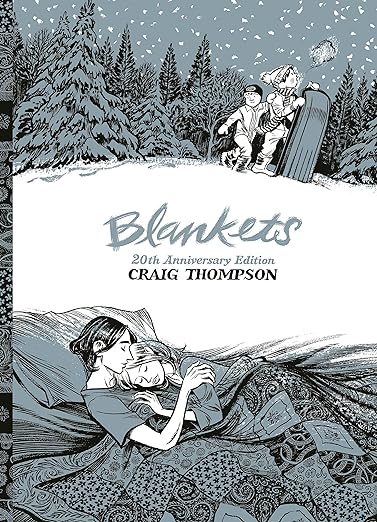
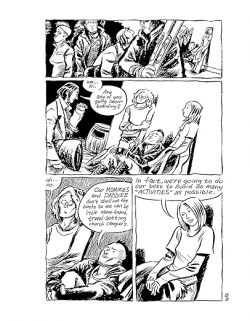 For such a weighty tome, Blankets is a remarkably quick and easy read, with Thompson’s imaginative and ingenious marriage of text and images carrying one along in the way only comics can. One of the most powerful and lovely tales of first love and faith lost, this book has lost none of its charm and seductive power over the decades. If you aren’t slavishly addicted to skimpily-clad incel-fodder or punch-in-the-face comics and have held on to the slightest shreds of your innate humanity, this is that rarest of beasts – a perfect story in pictures.
For such a weighty tome, Blankets is a remarkably quick and easy read, with Thompson’s imaginative and ingenious marriage of text and images carrying one along in the way only comics can. One of the most powerful and lovely tales of first love and faith lost, this book has lost none of its charm and seductive power over the decades. If you aren’t slavishly addicted to skimpily-clad incel-fodder or punch-in-the-face comics and have held on to the slightest shreds of your innate humanity, this is that rarest of beasts – a perfect story in pictures.


